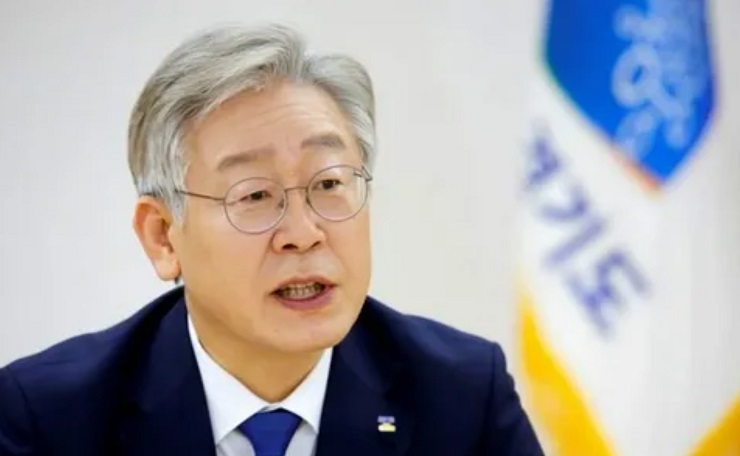As the author has written many times, the 2021-22 election race in South Korea is breaking records in terms of the amount of mud slung at both candidates, and clearly whoever saves the tastiest stuff for last has a better chance of success.
It seemed that the scandals surrounding Yoon Seok-yeol’s wife drew attention to the Conservative candidate, but soon the score was at least even.
As recently as a few years ago, the conservative party raised the suspicion that Lee Jae-myung, as mayor of Seongnam, had forced several companies to sponsor the city’s professional football club in exchange for solving their problems, mainly related to land use and building permits. At the same time, Lee was president of the club. As a result, between 2015 and 2017, six companies offered a total of 16.05 bn won ($13.3 million) to the team under the pretext of sponsorship and advertising fees. The police had investigated the charge since 2018 but dropped the case in September 2021 for lack of evidence. The prosecutor’s office filed a protest, but the case is now being handled by Seongnam Chief Prosecutor Park Eun-jeong, who attended the same university as Lee Jae-myung and played an active role as a Justice Ministry inspector in November 2020 in seeking disciplinary action against Attorney-General Yoon Suk-yeol.
Meanwhile, if it turns out that donations to the football club were made in exchange for services not approved by the government, it could be a crime of commercial bribery. Now the scandal has intensified again after Deputy Prosecutor Park resigned, claiming he was obstructing the investigation.
Next, Lee Jae-myung’s eldest son is suspected of receiving special treatment in the army as the son of the mayor of a major city. He joined the army in August 2013 and was admitted to the Armed Forces Capital Hospital in Seongnam for 52 days from July 29, 2014 without a proper military order. To be more accurate, the hospitalization order was signed retroactively a month later, so technically Lee-junior was AWOL the whole time. Moreover, a year after his hospitalization, Seongnam City Hall (i.e. Mayor Lee Jae-myung) increased the maximum area on which the Armed Forces Capital Hospital is located so that an Armed Forces trauma center could be built there, which was built as a four-storey building rather instead of three storeys thanks to the approval of the city authorities. A coincidence? Conservatives, of course, think otherwise.
Lee’s campaign headquarters acknowledged the prolonged hospitalization and said it would disclose the relevant order. But it was later “discovered” that due to an error on the part of the person in charge of personnel matters at the time, the order had not been issued, which according to Lee’s detractors, is unconvincing. It is unimaginable in the army for a soldier to be hospitalized without orders, and not in a regional hospital, but in a hospital in the capital.
But the strongest attack on Lee, like that on Yoon, turned out to be on his wife. It must be remembered that in Korea “attacks on a candidate’s family” have more killing power than anywhere else. First, he who cannot keep order in the family is considered incapable of running a state, and second, Korean politics is fond of moralizing, despite a popular expression roughly translated as “with others it is treason, with me it is love.”
And now SBS TV channel has reported that when Lee was governor, his subordinates had been running errands for his wife, Kim Hye-kyung, which amounts to abuse of power. A so far anonymous male official from the secretary’s office of the provincial government, who received orders from his supervisor in the department of general affairs surnamed Bae, has spoken, showing as evidence phone records from April to November 2021. In fact, it turns out that Lee officially hired Bae as his secretary as a matter of protocol for foreign visits, but she effectively worked as his wife’s private secretary.
Bae in this situation tried to take as much blame as possible. Lee Jae-myung also apologized and added that he would ask the auditing agency to investigate strictly whether there was any evidence of abuse of power.
Democratic Party chief Song Young-gil tried to stand up for Lee and said civil servants were performing routine secretarial duties, but his remarks were immediately met with harsh criticism. According to government regulations, spouses of heads of local authorities may not assign officials to carry out their personal tasks.
Hyun Geun-taek, a spokesman for Lee’s election committee, has attracted all the more attention for questioning the integrity of the whistleblower’s revelations.
But there is still no serious evidence against Lee – the Seongnam-gate trial has begun, but no charges against the mayor have been heard from this side. It is possible to inflate what has been described into serious abuse as part of a political struggle, but anything the Yoon and Lee camps have poured on each other so far is more likely to tarnish their reputations in the public eye than to warrant a serious criminal case.
But while the two main candidates go head to head, the importance of the third, who is playing his own, rather devious games, increases. But that is a story for another chapter.
Konstantin Asmolov, PhD in History, leading research fellow at the Center for Korean Studies of the Institute of the Far East at the Russian Academy of Sciences, exclusively for the online magazine “New Eastern Outlook”.

